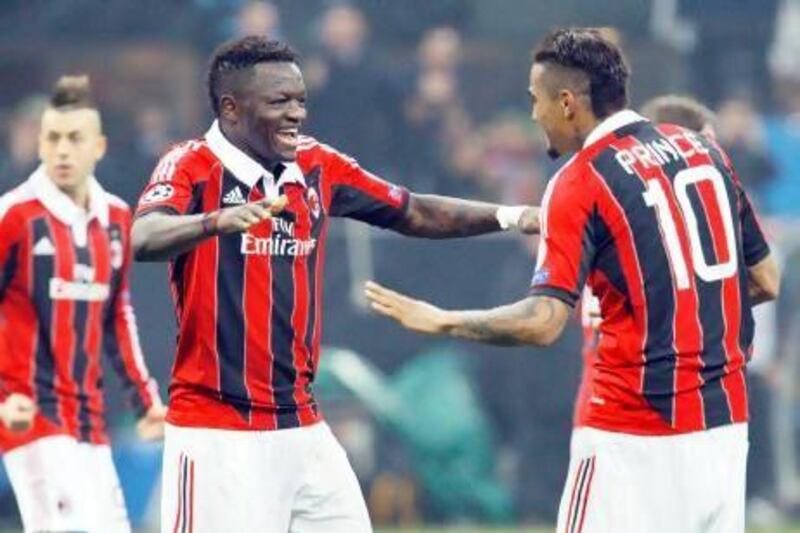After 10 matches undefeated, there is no doubt about the form team in Tueday's showdown in Catalonia.
If AC Milan's 2-0 win over Barcelona in the first leg of their last-16 Uefa Champions League tie appeared freakish, it was only so if you compared the names on the two team sheets and recalled the post-summer disruptions to the squad from which the Italians suffered markedly over the first three months of the season.
Since the turn of the year, the Rossoneri have been turbocharged.
"Pompey 2, Barcelona 0!" read one English newspaper headline after the San Siro leg. The reference was insular, the point was to emphasise that Lionel Messi, Xavi and Andres Iniesta's Barca had been felled by goals from men who both used to play for the now lowly Portsmouth, who are bottom of League One in England.
The careers of Kevin-Prince Boateng and Sulley Muntari have indeed known troughs as well as peaks, but they are footballers who include a World Cup quarter-final – with Ghana – on their CVs, as well as a stint each at Fratton Park.
Had both of them been to the Africa Cup of Nations with Ghana in January and February, Milan's 2013 renaissance may well have looked less impressive.
The year would certainly have had different headlines. Boateng made big news early in January when he left the field during a low-key friendly during the Serie A winter break in protest against racist abuse being directed at him at a lower-division stadium in Lombardy. His colleagues joined him in quitting the game. Many fellow professionals applauded his action.
It would be too easy to identify that moment as a demonstration of team unity, a musketeer spirit at a club who had gone into Christmas defeated 4-2 at Roma, and left themselves marooned in seventh place in the table, five points below Roma in sixth.
At the risk of betraying one of the points implied by Boateng that day – that sport should be colour-blind – it might also be noted that Milan's recent revival has been built around several African players, at the forefront of lifting the club back up to within two points of second spot in the domestic table and taking an advantage into tonight.
The Serie A run is best embodied by Mario Ballotelli. The Italy-born son of Ghanaian parents struck his fifth goal in five Milan games since joining from Manchester City in the 2-0 win over Genoa on Friday.
Cup-tied in Europe, Milan will miss him tonight, although less than they would had not Stephan El Shaarawy and Mbaye Niang showed such prodigious progress in the Milan attack.
El Shaarawy, the son of an Egyptian father and an Italian mother who turned 20 in October, has 18 goals in the league and Champions League; Niang, the France-born son of Senegalese parents, just 18, is expected to start tonight in the absence of the injured Giampaolo Pazzini and on the basis of his lively showings since the turn of the year.
In the No 10 position just behind that probable spearhead should be Boateng. His rise has been a credit to Massimiliano Allegri, a head coach proving as resourceful in redefining players' roles as he was, while guiding a more star-studded Milan in the first two years of his tenure, in managing temperamental individuals, such as Zlatan Ibrahimovic, Robinho and Antonio Cassano.
Boateng came to Milan, from Portsmouth, via a loan from Genoa. He carried with him a wilful streak and not much of a reputation as a playmaker. Allegri saw a dynamic No 10 somewhere in his DNA and liberated it.
Muntari, meanwhile, had the look of a stopgap signing when he was recruited, initially on loan, from Inter Milan, where he had won a Champions League in 2010 but had become marginal.
He was not even registered for European matches in September; he was not deemed in good enough form to be picked by Ghana for the 2013 Africa Cup of Nations – Boateng has retired from international football for that country – but his trusty left foot and competitive zeal were put to very effective use against Barcelona in Milan.
As for Kevin Constant, he has turned from being derided by fans as a symbol of Milan's lack of ambition in the transfer market to a lively left-back.
"It annoyed me when I heard people say 'Milan have lost players who inspired respect and brought in Constant and other cheap buys'," the Guinea international told L'Equipe.
He was more perturbed when, after an up-and-down career at Toulouse, Chateauroux of the French second division, Chievo and Genoa, he was told his role at Milan would be at full-back rather than the attacking midfielder he had grown up as.
For Constant, a red card at the weekend was a rare blemish in his accommodation of the new position over the past three months.
He feels grateful Allegri identified his potential as a full-back. He is no Paolo Maldini, but is emerging as another unlikely symbol of makeshift Milan's gathering renaissance.
Follow us
[ @SprtNationalUAE ]






